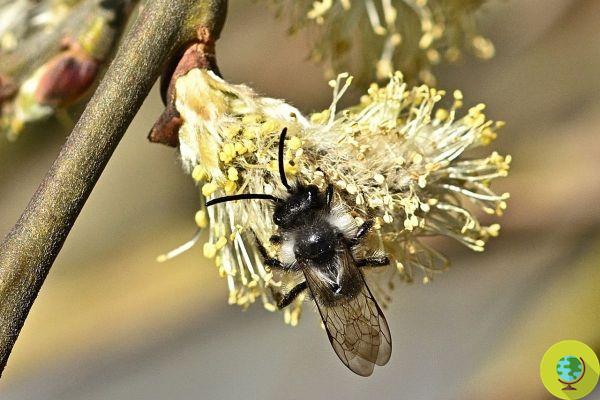
A new study demonstrates a reduction in the reproductive ability of insects and other negative impacts on the survival of the species
He is about to end up run over, his mother saves himA new study demonstrates a reduction in the reproductive ability of insects and other negative impacts on the survival of the species
It could take many generations of bees to recover from the damage of a single exposure to chemical insecticides, according to a new study from the University of California Davis. Previous research so far has highlighted the damage caused by pesticides to the environment and biodiversity, while little is known about the long-term effects these substances have on insects.
Research shows that even a single exposure to insecticides in the first years of a bee's life will forever affect its reproductive capacity and it will have effects on its descendants as well, but not only: since the effects of pesticides are cumulative, these will result in the general decline of the population of these insects. To demonstrate the extent to which environmental damage inflicted on bees passes through generations (the so-called Carryover Effect), the researchers conducted a two-year field experiment in which they analyzed how thebee in the blue orchard (Osmia lignaria) - a solitary wild bee - reacts to exposure to pesticides - in particular to neonicotinoids, a type of very toxic pesticide, the use of which is prohibited in the European Union (but not their production: in fact, enormous quantities of these substances are exported annually from the EU). In the United States, more than 40 products destined for sale are contaminated with these pesticides, according to a survey conducted by the National Pesticide Information Center.
This pesticide is present throughout the plant tissue and has consequences on the nervous system of bees: bees exposed only when they were larvae, have shown a reduction of their reproductive capacity equal to 20%, compared to bees that have never been contaminated by the substance; those exposed only once as adults have a fertility of 30% lower, while the bees exposed several times to contact with pesticides have a reduced fertility of 44%.
Pesticides, especially in agricultural areas, are used many times in a year and every year - he explains Clara Stuligross, author of the study. - This makes us understand what it actually means for the bee population: exposure to these substances reduces the reproductive capacity of bees, and even exposure occurring at a very young age or from the previous generation has effects on the adult life of these insects. The effects of pesticides accumulate and multiply over time: even a small series of exposures to substances is enough to inflict profound damage to the entire population.
The more we are able to understand how pesticides accumulate in the environment and what damage they cause to insect populations, the better it will be possible to predict the risks deriving from their use: reducing the exposure of insects to pesticides as much as possible is the only solution to limit the carryover effect and save ecosystems.
Follow your Telegram | Instagram | Facebook | TikTok | Youtube
Fonti: The Guardian / PNAS
We also recommend:
- Without bees and other pollinating insects 1/3 of flowering plants would produce no seeds, a fertility apocalypse
- Too many pesticides in the Mediterranean diet: fertility problems if organic products are not used, according to this new study
- Apocalypse of bees: 9% of pollinating insects risk extinction, according to the ISPRA report


























